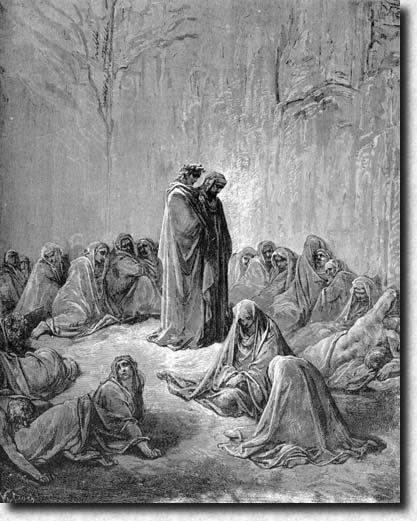One of the things that surprised me was, when I finally got around to reading the entire Divine Comedy, I really enjoyed the concept of Purgatory. I'm not saying that I would personally like to visit the place (having my eyes sewn shut like the Envious do doesn't appeal to me.) I'm saying the concept of Purgatory, as Dante defines it, is really neat.
As a Mormon, I read with a Mormon lens as my default position. (I also try to make feminism my default lens, which can make for some....interesting connections.) One of the thorny questions that Dante--and, I think, many theologians--faces is the idea of what to do for those who had no idea about Jesus, baptism, or saving ordinances. If, for example, baptism is an essential action, then those without it are, unequivocally, damned.
Dante tries to temper this a little by putting unbaptized, "virtuous pagans" and similar types in the first circle of Hell. It's not very deep, and, frankly, the place is pretty nice. But it's still Hell--the souls aren't with God and, rolling green hills and babbling brooks aside, they are damned. It's a harsh truth of God's justice, Dante seems to say, but it's there.
Mormon doctrine gives a little more leeway than that, and the way that's accomplished is via vicarious ordinances in LDS temples. Thus by proxy a deceased soul can be baptized. Through the actions of the living, postmortem salvation is possible.
And that's what resonates with me about Dante's Purgatory. In The Purgatorio, the souls are already baptized, but they aren't heaven-worthy. They must spend a portion of their afterlife climbing up Mount Purgatory, having their sins purged away. This allows for those who were good Christians, but messed up along the way, to still have a chance at redemption.
What I really like, though, is the idea that those who remain behind--the friends, family, and neighbors of the deceased--can, with their prayers and masses, accelerate the rising of the soul through Purgatory. Thus by piety a deceased soul can attain a postmortem salvation.
There are particular differences between Mormonism and Catholicism (obviously), and the doctrines don't perfectly parallel, but it's always neat to see some of yourself in works that might not normally appear to be directed straight to you. Finding threads of commonality between brothers and sisters is part of why I love literature so much.
As a Mormon, I read with a Mormon lens as my default position. (I also try to make feminism my default lens, which can make for some....interesting connections.) One of the thorny questions that Dante--and, I think, many theologians--faces is the idea of what to do for those who had no idea about Jesus, baptism, or saving ordinances. If, for example, baptism is an essential action, then those without it are, unequivocally, damned.
Dante tries to temper this a little by putting unbaptized, "virtuous pagans" and similar types in the first circle of Hell. It's not very deep, and, frankly, the place is pretty nice. But it's still Hell--the souls aren't with God and, rolling green hills and babbling brooks aside, they are damned. It's a harsh truth of God's justice, Dante seems to say, but it's there.
Mormon doctrine gives a little more leeway than that, and the way that's accomplished is via vicarious ordinances in LDS temples. Thus by proxy a deceased soul can be baptized. Through the actions of the living, postmortem salvation is possible.
And that's what resonates with me about Dante's Purgatory. In The Purgatorio, the souls are already baptized, but they aren't heaven-worthy. They must spend a portion of their afterlife climbing up Mount Purgatory, having their sins purged away. This allows for those who were good Christians, but messed up along the way, to still have a chance at redemption.
What I really like, though, is the idea that those who remain behind--the friends, family, and neighbors of the deceased--can, with their prayers and masses, accelerate the rising of the soul through Purgatory. Thus by piety a deceased soul can attain a postmortem salvation.
There are particular differences between Mormonism and Catholicism (obviously), and the doctrines don't perfectly parallel, but it's always neat to see some of yourself in works that might not normally appear to be directed straight to you. Finding threads of commonality between brothers and sisters is part of why I love literature so much.

Comments